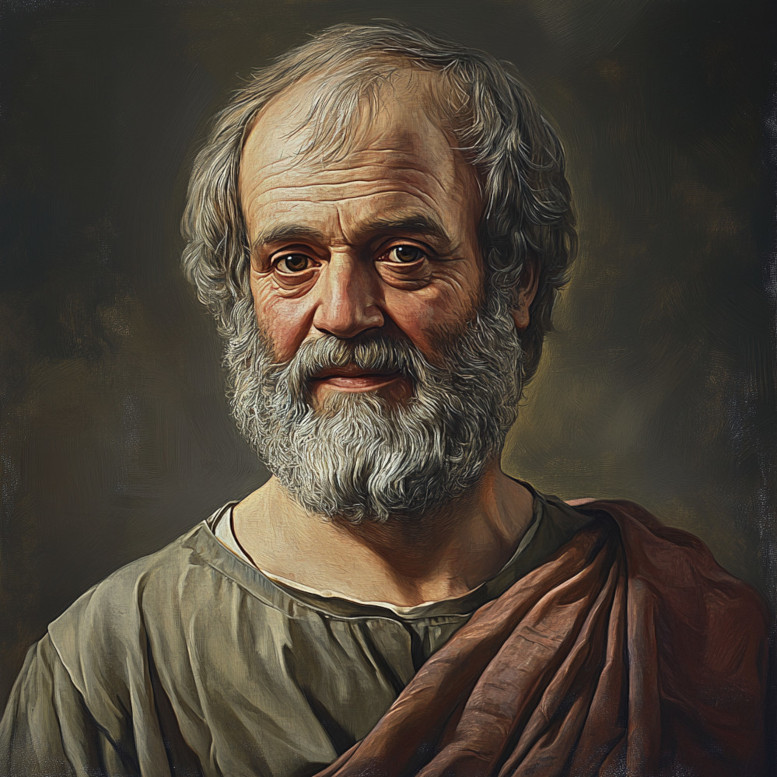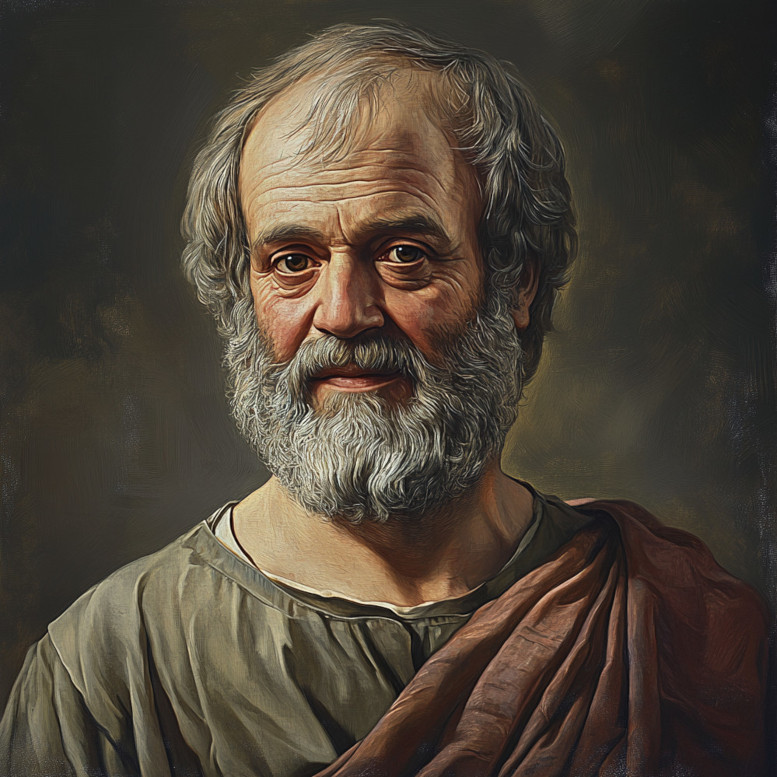


Aristotle (384–322 BCE) was a Greek philosopher and polymath during the Classical period in Ancient Greece. He was a student of Plato and later became the tutor of Alexander the Great. Aristotle is one of the most important founding figures in Western philosophy, and his work has profoundly influenced a wide range of fields, including metaphysics, ethics, politics, logic, biology, and more. His ideas and writings laid the groundwork for much of Western thought and continue to be studied and debated today.
Birth and Background: Aristotle was born in 384 BCE in Stagira, a small town in Macedonia, located in what is now northern Greece. His father, Nicomachus, was the personal physician to King Amyntas III of Macedon, which likely influenced Aristotle's early interest in biology and the natural sciences. Aristotle's parents died when he was young, and he was taken under the care of a guardian.
Education at Plato's Academy: At the age of 17, Aristotle moved to Athens, where he joined Plato's Academy, the leading institution of higher learning in the Greek world. He studied under Plato for about 20 years, until Plato's death in 347 BCE. While Aristotle was deeply influenced by Plato, he eventually developed his own philosophical ideas, which often diverged from those of his teacher.
Metaphysics: Aristotle's work in metaphysics explored the nature of reality, existence, and the fundamental nature of being. Unlike Plato, who believed in the existence of abstract Forms or Ideas as the true reality, Aristotle argued that the physical world is the real world and that forms are inseparable from objects. He introduced the concept of "substance" (ousia) as the underlying reality of all things, which combines both form and matter. His exploration of causality, particularly the "four causes" (material, formal, efficient, and final), has had a lasting impact on metaphysical thought.
Ethics: Aristotle's Nicomachean Ethics is one of his most influential works, where he discusses the nature of the good life and virtue. He introduced the concept of eudaimonia, often translated as "happiness" or "flourishing," as the highest human good. Aristotle argued that achieving eudaimonia requires living a life of virtue, which involves finding the mean between extremes of excess and deficiency (the "Golden Mean"). His virtue ethics, emphasizing character and moral virtues like courage, temperance, and justice, remains a central theory in moral philosophy.
Politics: In his work Politics, Aristotle examines the nature of human communities and the role of the state in achieving the good life for its citizens. He argued that humans are "political animals" by nature and that the state exists to promote the common good. Aristotle classified different forms of government, such as monarchy, aristocracy, and democracy, and analyzed their strengths and weaknesses. He advocated for a mixed government, combining elements of democracy and oligarchy, which he believed would best serve the interests of the citizens.
Logic: Aristotle is often credited with founding formal logic, and his work in this area was the dominant influence on Western logic until the 19th century. His Organon is a collection of six works that explore different aspects of logic, including the Categories, On Interpretation, and Prior Analytics. Aristotle's system of deductive reasoning, particularly the syllogism (a form of argument where a conclusion is drawn from two premises), became the standard method for logical reasoning in the Western tradition.
Biology and Natural Sciences: Aristotle made significant contributions to biology and the natural sciences, drawing on his observations of the natural world. He classified living organisms into different categories and studied their anatomy, reproduction, and development. His works History of Animals, On the Parts of Animals, and On the Generation of Animals are some of the earliest systematic studies of biology. Although many of his biological theories were later proven incorrect, his method of careful observation and classification laid the groundwork for future scientific inquiry.
Tutoring Alexander the Great: In 343 BCE, Aristotle was invited by King Philip II of Macedon to tutor his son, Alexander, who would later become known as Alexander the Great. Aristotle's influence on Alexander is debated, but it is likely that Aristotle's teachings on philosophy, ethics, and politics left a lasting impression on the young prince.
Lyceum and Peripatetic School: After his time in Macedon, Aristotle returned to Athens in 335 BCE, where he founded his own school, the Lyceum. The Lyceum became a major center of learning, and Aristotle's students, known as the Peripatetics (from the Greek word peripatetikos, meaning "walking about," referring to the covered walkways where Aristotle and his students would discuss philosophy), continued to study and develop his ideas.
Writings and Legacy: Aristotle was a prolific writer, and his works cover a wide range of subjects, including philosophy, science, ethics, politics, rhetoric, and aesthetics. Although only a fraction of his writings have survived, they have had a profound and enduring influence on Western thought. During the Middle Ages, Aristotle's works were reintroduced to the Islamic world and later to medieval Europe, where they were integrated into Christian theology, particularly through the works of Thomas Aquinas.
Death: Aristotle died in 322 BCE in Euboea, Greece, at the age of 62. He left behind a rich legacy that would shape the development of Western philosophy and science for centuries to come.
Influence on Philosophy and Science: Aristotle's influence on Western thought cannot be overstated. His works on metaphysics, ethics, logic, and natural science laid the foundation for much of Western intellectual history. Medieval scholars, particularly in the Islamic world and Christian Europe, revered Aristotle as "The Philosopher," and his ideas became deeply integrated into the scholastic tradition.
Enduring Relevance: Aristotle's ideas continue to be studied and debated by philosophers, scientists, and scholars today. His work on ethics, particularly the concept of virtue ethics, has seen a resurgence in contemporary moral philosophy. His contributions to logic remained the standard until the development of modern symbolic logic, and his approach to scientific inquiry, though outdated in some respects, still serves as a model for careful observation and systematic classification.
Cultural Influence: Aristotle's philosophy has permeated Western culture, influencing literature, politics, religion, and education. His ideas about the nature of reality, human nature, and the pursuit of the good life have been foundational to Western thought and continue to resonate in modern discussions of ethics, politics, and science.
Aristotle's vast body of work and his contributions to numerous fields have made him one of the most influential figures in the history of Western philosophy and science. His ideas have shaped the intellectual landscape of the West for over two millennia, and his legacy continues to inspire and challenge thinkers in the present day. As a philosopher, scientist, and teacher, Aristotle's pursuit of knowledge and understanding has left an indelible mark on the world, making him one of history's greatest minds.

We use cookies
We use cookies and other tracking technologies to improve your browsing experience on our website, to show you personalized content and targeted ads, to analyze our website traffic, and to understand where our visitors are coming from. Privacy Policy.